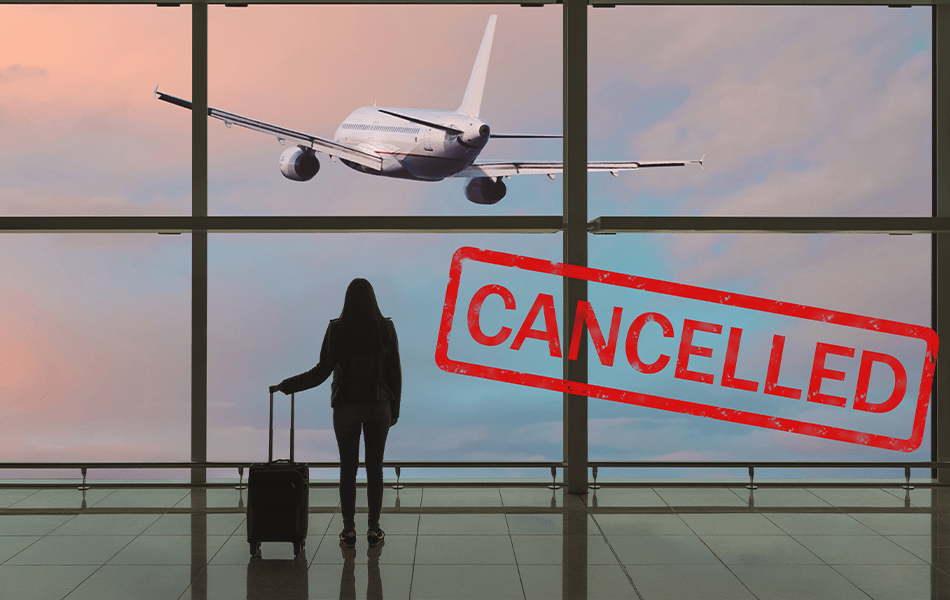Have you ever experienced a canceled flight? If you have, you know how frustrating it can be to have your travel plans disrupted. In recent times, the airline industry in the Philippines has witnessed a surge in canceled flights due to various reasons, including unforeseen circumstances and external factors. Whether it’s due to inclement weather, technical issues, or operational reasons, flight cancellations have become a common occurrence that can significantly impact travelers. As a passenger, it is important to be well-informed about the cancellation policies of airlines operating in the country.
Here is the overview of the current canceled flight policy in the Philippines to empower travelers with the knowledge necessary to navigate potential disruptions.
1. Reasons for Flight Cancellations:
Flight cancellations in the Philippines can occur due to various reasons, and it’s important for passengers to understand the factors that can lead to these disruptions. One of the primary causes of flight cancellations is adverse weather conditions. The Philippines is prone to typhoons, heavy fog, and volcanic ash, which can create hazardous flying conditions. In such situations, airlines prioritize passenger safety and opt to cancel flights to avoid potential risks.
- Technical issues with the aircraft can also result in flight cancellations. Despite rigorous maintenance and safety checks, mechanical failures or equipment malfunctions can occur unexpectedly. Airlines have strict protocols in place to ensure the airworthiness of their aircraft, and if a technical issue is identified before a flight, it may be canceled or delayed until the problem is resolved.
- Operational problems within the airline can also contribute to flight disruptions. This can include issues such as crew scheduling conflicts, where a flight may need to be canceled if there are insufficient crew members available to operate it. Similarly, if there is a shortage of aircraft due to maintenance or logistical challenges, the airline may have to cancel flights until the situation is rectified.
2. Responsibilities of the Airline:
When a flight is canceled, airlines have a set of responsibilities toward their passengers to ensure that they are adequately informed and assisted during the disruption. These responsibilities help minimize the inconvenience caused by flight cancellations and provide passengers with suitable alternatives.
- Prompt Communication: Airlines are expected to promptly notify passengers about the cancellation of their flights. This notification can be through various channels, including email, text messages, phone calls, or announcements at the airport. By informing passengers as soon as possible, airlines allow them to adjust their plans and make necessary arrangements.
- Valid Explanation: Passengers have the right to know the reason behind the flight cancellation. Airlines should provide a valid explanation for the disruption, whether it’s due to adverse weather conditions, technical issues, or operational problems. This transparency helps passengers understand the circumstances and accept the cancellation with a clearer perspective.
- Rebooking Passengers: In the event of a canceled flight, airlines should offer passengers the option to rebook on the next available flight to their destination. The rebooking process should be hassle-free, with the airline taking the initiative to find suitable alternatives for affected passengers. This may include adjusting the booking to another flight operated by the same airline or arranging connections through partner airlines, ensuring that passengers can reach their intended destinations as soon as possible.
- Alternative Travel Options: In certain cases, rebooking may not be immediately possible due to limited seat availability or other constraints. In such situations, airlines should explore alternative travel options, such as rerouting passengers through different airports or providing transportation to nearby destinations where flights are available. These alternative arrangements aim to minimize the impact of the cancellation and help passengers reach their intended destinations with minimal disruption.
- Compensation or Reimbursement: If the cancellation is within the airline’s control, such as due to operational issues, airlines are expected to provide compensation or reimbursement for reasonable expenses incurred by passengers. This may include covering the cost of accommodation, meals, transportation, or other necessary expenses resulting from the cancellation. Passengers should retain receipts and relevant documentation to support their claims for reimbursement.
- Clear Instructions and Assistance: Airlines should provide clear instructions to passengers on how to proceed after a flight cancellation. This includes directing passengers to appropriate service desks or customer service representatives who can assist with rebooking, refunds, or other necessary arrangements. Additionally, airlines should offer assistance in facilitating necessary accommodations or transportation for passengers who may require it.
3. Passengers’ Rights and Entitlements:
Passengers in the Philippines are granted certain rights and entitlements under the Air Passenger Bill of Rights (APBR). This legislation is designed to protect passengers and ensure fair treatment in cases of flight cancellations, among other issues.
- Compensation for Canceled Flights: The APBR stipulates that if a flight is canceled due to factors within the airline’s control, such as maintenance problems or crew scheduling issues, passengers have the right to compensation or rebooking on the next available flight without any additional charges. This means that if the cancellation is caused by circumstances that could have been prevented or managed by the airline, passengers are entitled to receive compensation or have their flights rearranged at no extra cost. The specific compensation amounts and procedures may vary depending on the circumstances and the airline’s policies.
- Rebooking Options: In addition to compensation, the APBR guarantees passengers the right to be rebooked on the next available flight if their original flight is canceled. This ensures that passengers are provided with suitable alternatives that enable them to reach their destination as close to their original schedule as possible. Airlines are responsible for facilitating the rebooking process and ensuring that passengers are accommodated on suitable flights.
- No Additional Charges: Passengers have the right to be rebooked without any additional charges when their flights are canceled due to factors within the airline’s control. This means that if the airline is responsible for the cancellation, passengers should not be required to pay any extra fees or penalties for rescheduling their flights.
- Fair Treatment and Information: The APBR mandates that airlines provide fair treatment to passengers affected by flight cancellations. This includes providing timely and accurate information about the cancellation, its reasons, and the available alternatives. Airlines are expected to communicate with passengers in a clear and transparent manner, ensuring that they are well informed about their rights and the options available to them.
- Passenger Well-being: The APBR also emphasizes the importance of passenger well-being during flight disruptions. Airlines are obliged to provide necessary assistance, such as meals, accommodations, and transportation, to passengers who experience significant delays or are stranded due to a canceled flight. These provisions are meant to alleviate any hardships passengers may face as a result of the cancellation.
4. Travel Insurance and Protection:
To mitigate the potential impact of flight cancellations, passengers can consider purchasing travel insurance or choosing airlines that offer comprehensive travel protection plans. Travel insurance can provide coverage for various unforeseen circumstances, including canceled flights, medical emergencies, or lost luggage. Some airlines may also offer optional travel protection plans that provide similar coverage and additional assistance during travel disruptions.
5. Precautionary Measures:
While flight cancellations are beyond passengers’ control, there are precautionary measures that can be taken to minimize inconvenience. Booking flights with reputable airlines known for their reliability and punctuality can reduce the likelihood of cancellations. Allowing for ample transit time between connecting flights can provide a buffer in case of delays or cancellations, especially when booking separate tickets with different airlines. It’s also important to keep important contact information readily available, such as the airline’s customer service number or your travel agent’s contact details, so you can quickly reach out for assistance when needed.
Thus, flight cancellations can be a significant source of inconvenience for travelers. So, when planning your travels, it’s also essential to consider the accommodations at your destination. BRIA Homes offer a compelling option for travelers seeking comfortable and affordable housing. Whether you’re exploring different countries or discovering the beauty of the Philippines, BRIA Homes provide a reliable base to come back to after your adventures.
Lastly, remember to stay informed about the cancellation policies of airlines, know your rights as a passenger, and consider travel protection measures. By doing so, you can navigate flight disruptions more effectively and make the most out of your travel experiences. And when it’s time to settle down, consider BRIA Homes as a destination to create lasting memories and build a home in a community that values your comfort and well-being.





